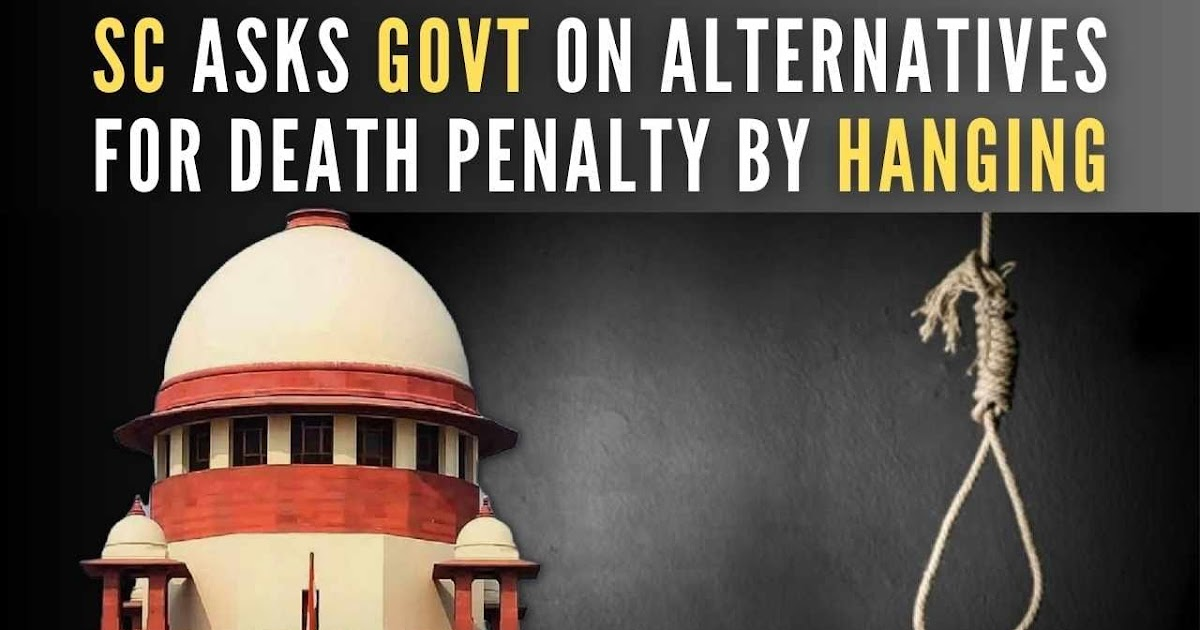ALTERNATIVE TO DEATH BY HANGING

Copyright infringement not intended
Context: In the Supreme Court, the Union Government stated that it is considering the formation of a committee to investigate the need for a painless and more dignified alternative to death by hanging.
Details
- This move could potentially end the barbaric and inhuman practice of executing death row convicts by hanging them by the neck until they are dead.
- Hanging is not only cruel and painful, but also violates the fundamental right to life and dignity of the condemned prisoners.
- Hanging as a mode of execution has been challenged several times in the past because it is inconsistent with Article 21 of the Constitution, which guarantees the right to life and personal liberty.
Background of the Present Context
- A petition was filed in the Supreme Court seeking to abolish hanging and adopt other methods such as lethal injection or electrocution, which he claimed are comparatively less painful and more humane.
- The Supreme Court, in March 2023, directed the Centre to gather information on the less painful modes of execution than hanging by the neck in death sentence cases in the country.
- The court also suggested that the Centre could set up an expert panel to examine the issue from the standpoint of science and technology and find an approach that is both humane and socially acceptable.
Alternatives for death by hanging
- Alternatives for death by hanging are lethal injection, firing squad and electrocution. These methods are used in some other countries that still retain capital punishment. However, each of these methods has its drawbacks and controversies.
- A lethal injection may cause severe pain and suffering if the drugs are not administered properly or if the prisoner has a medical condition that affects the effectiveness of the drugs.
- A firing squad may result in a prolonged and bloody death if the shooters miss the vital organs or if there are multiple rounds of firing.
- Electrocution may cause severe burns, mutilation and disfigurement of the body.
- Therefore, there is no clear consensus on which method of execution is the most humane and dignified.
Why need an alternative to the Death penalty?
- The death penalty is one of the most controversial and debated topics in the world.
- Some people argue that it is a necessary and effective deterrent for serious crimes, while others claim that it is a cruel violation of human rights. In this blog post.
Arguments against the death penalty
Irreversible
- One of the main arguments against the death penalty is that it is irreversible. Once a person is executed, there is no way to correct a possible mistake or injustice.
Mistakenly convicted
- There is also evidence that many innocent people have been wrongly convicted and sentenced to death.
Discriminatory
- Another argument against the death penalty is that it is discriminatory and arbitrary.
- The death penalty is often applied disproportionately and unfairly, depending on factors such as race, ethnicity, religion, gender, social status, or political affiliation.
- The death penalty is often influenced by political pressure or public opinion, rather than by the merits of each case.
Does not deter crime
- There is no conclusive evidence that the death penalty has any effect on reducing crime rates or preventing future crimes.
- Some studies have suggested that the death penalty may have the opposite effect, by creating a brutalizing or desensitizing effect on society.
Not addressing the root cause
- The death penalty does not address the root causes of crime, such as poverty, inequality, lack of education, or mental illness.
- Rather than killing offenders, we should focus on rehabilitating them and preventing them from reoffending.
Alternatives to the Hanging or death penalty
Life imprisonment without parole
- This means that the offender will spend the rest of their life in prison, with no possibility of release.
- This option can still provide justice and protection for society, without violating human dignity or risking innocent lives.
Restorative Justice
- This means that the offender will have to face the consequences of their actions and make amends with their victims or their families.
- This option can foster healing and reconciliation for parties, rather than revenge and hatred.
Conclusion
- The formation of an expert committee could pave the way for much-needed reform in the death penalty jurisprudence in India. It could also bring India in line with the international standards and norms on the abolition or restriction of capital punishment. It is high time that India abolishes or at least revises its archaic and brutal method of hanging and adopts a more civilized and compassionate way of dealing with its most heinous offenders.
Must Read Articles:
Death Penalty in India: https://www.iasgyan.in/daily-current-affairs/death-penalty-in-india
|
PRACTICE QUESTION Q. The principle of "an eye for an eye, a tooth for a tooth, a life for a life" is often used to justify the death penalty in some societies. However, this principle has been criticized for being too harsh, unjust, and ineffective. What are some alternative ways of dealing with serious crimes that do not involve taking away the life of the offender? |






1.png)
